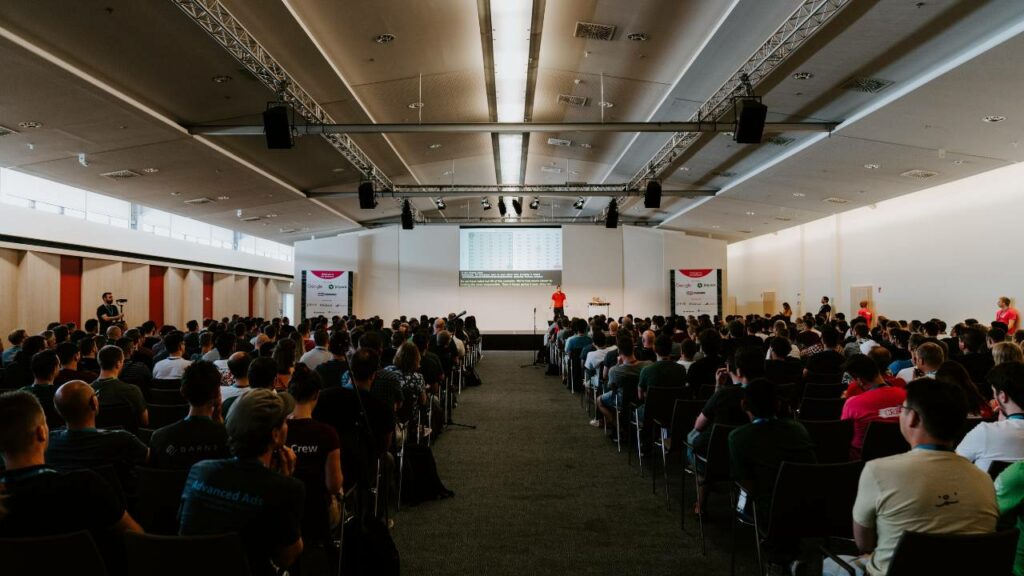In today’s competitive business landscape, hosting successful conferences and exhibitions is essential for standing out in your industry. Elevating your business events can help create unforgettable experiences that foster connections, increase brand visibility and drive growth. This guide will walk you through key considerations to keep in mind when planning and executing stellar conferences and exhibitions.
Understanding the Importance of Business Events
Business events play a pivotal role in the growth and development of your company. These gatherings provide valuable opportunities for professionals in your industry to connect, learn and collaborate.
Attending conferences and exhibitions is essential for your small business, as they offer an ideal platform to stay updated on the latest trends, advancements and innovations in your sector. By participating, you not only gain access to a wealth of knowledge but also get the chance to demonstrate your expertise to your peers and potential clients.
In the dynamic realm of B2B operations, you benefit immensely from face-to-face interactions. Networking is crucial, and business events allow you to forge connections with key players in your field. These relationships often lead to fruitful partnerships, collaborations and referrals, which are instrumental in elevating your business to greater heights.
Moreover, hosting or sponsoring such events further enhances your company’s reputation as a thought leader. It showcases your commitment towards shaping the future of your industry attracting potential partners, investors and clients.
Planning Your Business Events
Conceptualising Your Goals
Before you start planning your business event, it’s essential to determine your objectives and goals. Ask yourself what you want to achieve with this event. Are you looking to increase brand awareness, generate leads, or network with industry professionals? By setting specific, measurable, achievable, relevant, and time-bound (SMART) goals, you’ll have a clear direction for your event, making it easier to allocate resources and budget accordingly. For example, Vinehall, a reputable conference, exhibition and event production company, has achieved success by establishing SMART goals for their events.
Assembling Your Team
A successful business event relies heavily on teamwork and collaboration. So, be sure to assemble a capable and dedicated team of employees. Typically, your team should consist of:
- Marketing team: They are responsible for promoting the event, targeting the right audience and generating interest.
- Sales team: Their expertise is critical in reaching out to potential clients, sponsors, and partners.
- Event planner: This person will coordinate all aspects of the event, from venue selection to catering.
- Content curator: This team member will be responsible for sourcing and organising presentations, workshops, and other activities to engage attendees.
When building your team, make sure you involve them in the planning process from the beginning. Keep communication channels open so everyone is up-to-date on progress and can contribute their ideas and expertise. Collaborate regularly through meetings, video calls, and emails to ensure everyone stays on track.
Choosing the Right Events

As you plan for your business events, it’s important to carefully choose which conferences and exhibitions to attend. This will have a significant impact on the success of your endeavour and your ability to connect with others in your industry.
Conferences Vs. Exhibitions
Conferences generally offer a more formal and educational setting, focusing on industry-specific presentations and seminars by experts in the field. They provide a great opportunity for knowledge sharing and networking within your chosen sector.
Exhibitions, on the other hand, tend to be more trade-centric, showcasing products, services, and innovations from various companies. They’re an excellent space for discovering new products and services, meeting potential partners, and generating leads.
Evaluate your goals and what you hope to gain from attending each type of event. While all business events provide value, one type of it may be more suited to your objectives and business needs than the other.
Evaluating Potential Venues
Once you’ve decided on the type of event that aligns with your objectives, you’ll need to select the appropriate venue. Here are a few factors to consider when evaluating potential locations:
- Industry relevance: Prioritise events that are directly related to your specific industry or niche. This will ensure that your attendance is as beneficial as possible, providing opportunities to engage with relevant professionals and potential customers.
- Geographical location: Depending on your target market, you may want to consider events taking place in Europe or those closer to your business base. Keep in mind the travel and accommodation costs that will be incurred by attending events in various locations.
- Size and scope: The scale of an event can affect the networking opportunities, visibility of your company, and direct competition you may face. Large events attract a wider audience but may make it harder to stand out. Smaller, more focused events often offer more personalised interactions and networking opportunities.
- Reputation: Research the history and credibility of the organisers, the quality of past events, and feedback from previous attendees. Ensure that the event aligns with your company’s values and reputation within your industry. Investing time and resources in a well-regarded event will likely yield better results.
Promoting Your Events
Leveraging Social Media
Social media platforms, such as Facebook and Instagram, are powerful tools to promote your event. Create engaging content and share regular updates about your event. You can use visually appealing images, short videos, and interesting snippets to grab your audience’s attention. Don’t forget to use relevant hashtags to widen your reach.
Consider creating a dedicated event page on Facebook, which enables you to provide details about your event and allows potential attendees to express their interest. Remember to link this page to your website and other social media channels.
Maximising PR Opportunities
Public relations (PR) plays a significant role in promoting your event. Collaborate with journalists and influencers who are interested in your industry. Share news releases and informative articles about your conference or exhibition, highlighting notable speakers, sessions, and unique features.
In addition, you can utilise newsletters to keep your key stakeholders informed. Include compelling content, such as interviews with industry experts and exclusive previews to spark their interest. Make sure you add the necessary details, like registration information and event dates, with a strong call to action.
Capitalising on Partnership and Sponsorship
Partnerships and sponsorships are essential in elevating the profile of your event. Reach out to relevant industry partners and potential sponsors who share your target audience. Offer them promotional opportunities, such as event signage, digital banner ads on your website, and mentions in your marketing materials.
Develop bespoke packages for your partners and sponsors, giving them exclusive benefits like discounted exhibition booths or tickets. By doing this, you’ll create valuable relationships that contribute to the success of your event and potentially open doors for future collaborations.
At the Event

Maximising Networking Opportunities
When you attend a business event, one of your main goals should be to maximise networking opportunities, all while understanding corporate ethics. You can achieve this by participating in informal and dynamic activities, such as entertainment and food and beverage areas. These settings often encourage participation and interaction with other attendees, helping you to form connections and arrange potential meetings.
Ensure you come prepared with your business cards and any relevant information or promotional materials. When networking, be friendly and open to conversations and remember to ask for others’ contact details, too.
Engaging with Attendees
It’s essential to engage with attendees, potential clients, and potential customers during the expo or convention. Start by making sure that you arrive early to complete your registration process, giving yourself enough time to familiarise yourself with the venue and its layout.
Actively seek out your target audience members and engage in conversations with them. Be approachable and welcoming, always ready to provide information and answer questions. Your tone should be friendly, and you should aim to be genuinely interested in their requirements and feedback.
Showcasing Your Company and Products
A key aspect of any business event is showcasing your company and products. You might be launching a new product or simply aiming to raise awareness of your company within the industry. In either case, you will want to create an attractive and attention-grabbing display that showcases your best assets.
Consider the following elements when designing your exhibition space:
- Visual identity: Your stand should reflect your company’s branding, colour scheme, and style.
- Product presentation: Display your products or services in a way that highlights their benefits and functionality.
- Interactive elements: Encourage participation and engagement with your stand, such as product demonstrations or hands-on experiences.
- Promotional materials: Offer attendees promotional materials or giveaways to remember your brand and make a lasting impression.
Post-Event Strategies
Follow-up Strategies
It’s essential to have a solid follow-up strategy after your conference or exhibition. Promptly reconnect with the people you met at the event. Use personalised emails or phone calls to demonstrate your interest in maintaining a relationship. Consider nurturing these connections through social media, for example:
- Share your event photo albums on Facebook and LinkedIn
- Tag professionals you’ve met on Twitter or Instagram
- Engage with event participants in LinkedIn Groups or Twitter chats
Maximise your event growth and exposure by showcasing your brand’s thought leadership in blog posts, newsletters, or webinars. Be sure to address key insights from industry experts and tap into relevant topics that resonate with your target audience.
Measuring Event Success
To gauge the success of your conference or exhibition, track important metrics that correlate to your business objectives. Key performance indicators (KPIs) play a crucial role in determining event ROI. Some vital KPIs include:
- Leads: number of new business contacts collected
- Exposure: social media mentions, press coverage, and website traffic
- Brand Awareness: survey responses, attendee feedback, and branded materials circulated
Ensure you collect all relevant data during the event to make these analyses accurate and beneficial for future endeavours.
Inform and Educate Stakeholders
Keeping stakeholders informed of the event outcomes is crucial for continuous support and collaboration. Share detailed reports on event performance and findings, emphasising the benefits for your business, like increased brand awareness or lead generation.
Ensure continuous learning and growth by educating your stakeholders on the best practices employed and valuable lessons learned during the event. Host internal webinars or workshops to engage your team members, empowering them to contribute to your future events’ success.
Long-Term Strategies for Business Events

Investing in Business Events
As a business owner, you should consider investing in conferences and exhibitions as part of your long-term strategy. By participating in these events, you can increase your company’s visibility, attract potential investors, and boost sales. Prioritise allocating a budget to participate in reputable business events within your industry. This may include securing a booth at an exhibition, sponsoring a conference, or even hosting your own event. With a well-thought-out investment plan, you can maximise the benefits of business events, leading to consistent growth.
Sustainability and Business Events
The growing emphasis on sustainability plays a significant role in shaping your business event strategy. Adopting eco-friendly practices and promoting sustainable initiatives within your events can improve your company’s image and attract like-minded attendees. Think about ways to reduce the environmental impact of your events, such as opting for reusable materials, discouraging excessive waste, and encouraging digital communication. Additionally, consider partnering with organisations that share your commitment to sustainability in order to amplify your efforts.
Learning from Past Events
Continuous improvement is essential for elevating your business events. By analysing previous conferences and exhibitions, you can identify areas to optimise and implement best practices. Use the feedback gathered from attendees, exhibitors, sponsors, and staff to refine your approach to future events. Additionally, staying informed about innovations in event design can help you incorporate fresh ideas into your planning. By consistently learning from past experiences and staying up-to-date, you can ensure your business events remain relevant and beneficial in the long run.
Conclusion
As you strive to elevate your business events, it’s essential to focus on the unique aspects of conferences and exhibitions. By understanding the value of these events, you can tailor your approach to create unforgettable experiences for your attendees.
Remember to consider the goals and objectives of your event, ensuring that the content and format align with the needs of your audience. By engaging reputable speakers and choosing quality products to showcase at exhibitions, you’ll provide value and insight to your attendees.
